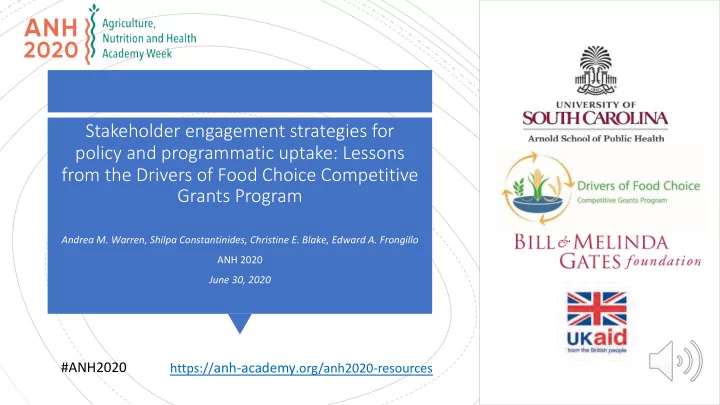

Stakeholder engagement strategies for policy and programmatic uptake: Lessons from the Drivers of Food Choice Competitive Grants Program Andrea M. Warren, Shilpa Constantinides, Christine E. Blake, Edward A. Frongillo ANH 2020 June 30, 2020 #ANH2020 https:// anh-academy .org/anh2020-resources
Background Major challenges: Stakeholder • Stakeholders = Double burden engagement diverse = = • Engagement Grand challenge for Research strategies: relevance LMIC decision-makers Ø Know-how and uptake Ø Time Ø Resources
Background • Drivers of Food Choice Competitive Grants Program • DFC Competitive Grants Program • 15 projects in 10 LMICs • All designed and implemented stakeholder engagement strategies to promote uptake tailored to context – no standard template The purpose of the Drivers of Food Choice program is to facilitate, synthesize and disseminate research to provide a deep understanding of the drivers of food choice among the poor in developing countries. DFC projects also aim to strengthen country-level leadership in nutrition and foster a global community of food choice researchers.
Objective Derive lessons learned about designing and implementing stakeholder engagement strategies ààà Advance knowledge about best practices
Methods • DFC Competitive Grants Program • 15 projects in 10 LMICs • All designed and implemented stakeholder engagement strategies to promote uptake tailored to context • Document review Ø Project proposals Ø Project reports • Semi-structured interviews with project leads (n=15) • Topic: experiences designing and implementing strategies, what works, recommendations for improvement • Thematic analysis using a priori and inductive codes à thematic survey • Dissemination and implementation science
Uni-directional engagement Bi-directional engagement strategies strategies Defining Researcher-driven and Carried out collaboratively characteristics informational, no input from with stakeholders Results: the target stakeholder Goals Increase buy-in and Produce knowledge generate demand for results collaboratively to enhance Overview to promote the use of the immediate applicability evidence for decision- of research. making. Examples Emails, newsletters, Stakeholder mapping meetings, press releases, exercises, collaborative technical briefs, newspaper inception workshops, results articles, public engagement validation exercises, efforts collaborative development of recommendations
Uni-directional engagement strategies Defining Researcher-driven and informational, no Uni-directional characteristics input from the target stakeholder strategies Goals Increase buy-in and generate demand for results to promote the use of evidence for • Benefits decision-making. • Limitations Examples Emails, newsletters, meetings, press releases, technical briefs, newspaper articles, public engagement efforts
Bi-directional Bi-directional engagement strategies strategies Defining Carried out collaboratively with characteristics stakeholders • Benefits • Notes on implementation Goals Produce knowledge collaboratively to • Limitations enhance the immediate applicability of “…[the inception meeting] research. didn't shape the research from the beginning enormously - we already had a clear idea about Examples Stakeholder mapping exercises, our aims and methods, but […] collaborative inception workshops, it made us realize which of those particular elements results validation exercises, were especially important and collaborative development of how we needed to focus to recommendations make it all very accessible in terms of what we find.”
1. Tailor strategies based on goals for uptake and impact Conclusions pathways specific to context: “We had had experiences Ø mix of strategies and key which were bad in the past. Ø timing of engagement Researchers go ahead, takeaways Ø frequency of contact design their studies, implement them, come up with findings, then bring 2. Use both uni-and bi- the findings to [us] to directional strategies. implement. Some of the questions we would pose to the researchers - where 3. Engage throughout, not were [we] when these ideas only at dissemination. were hatched out?” 4. Participation facilitates uptake.
Recommendations RESEARCHERS SHOULD SYSTEMATICALLY FUNDING ORGANIZATIONS SHOULD DOCUMENT THEIR ENGAGEMENT ALLOCATE RESOURCES FOR THESE STRATEGIES AND EXPERIENCES ACTIVITIES TO ADVANCE BEST PRACTICES
Acknowledgements and funding statement • DFC investigators • BMGF and UK DFID This research has been funded by the Drivers of Food Choice (DFC) Competitive Grants Program, which is funded by the UK Government’s Department for International Development and the Bill & Melinda Gates Foundation, and managed by the University of South Carolina, Arnold School of Public Health, USA; however, the views expressed do not necessarily reflect the UK Government's official policies.
Recommend
More recommend